6 Powerful Ways to Boost Sales with Sustainability on Shopify
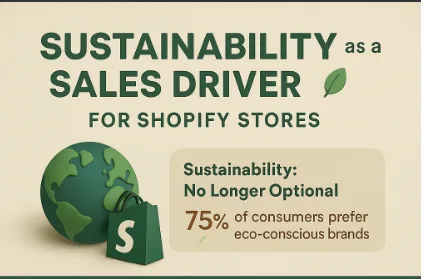
Table of Contents
Boost sales and build trust with eco-conscious customers! Learn how Shopify helps you integrate sustainability into your store with carbon-neutral shipping, eco-friendly product highlights, and trust-building badges. Stay ahead of the green eCommerce trend today.
Imagine this: A customer is browsing your store, ready to check out, but something makes them hesitate. They’re wondering—“Is this brand actually eco-friendly, or just saying it?” Now, what if you could erase their doubts with a simple badge or a note about carbon-neutral shipping? That’s the power of making sustainability a core part of your Shopify store.
Going green isn’t just about saving the planet—it’s about earning trust, standing out, and increasing conversions. Customers love brands that care, and Shopify gives you all the tools to showcase your eco-friendly efforts without making it complicated.
Let’s break it down.
1. Carbon-Neutral Shipping: Small Action, Big Impact
Think about how many packages are delivered every day. Now, think about the carbon emissions that come with them. It’s a lot, right? But here’s the good news: Shopify lets you offer carbon-neutral shipping without lifting a finger.
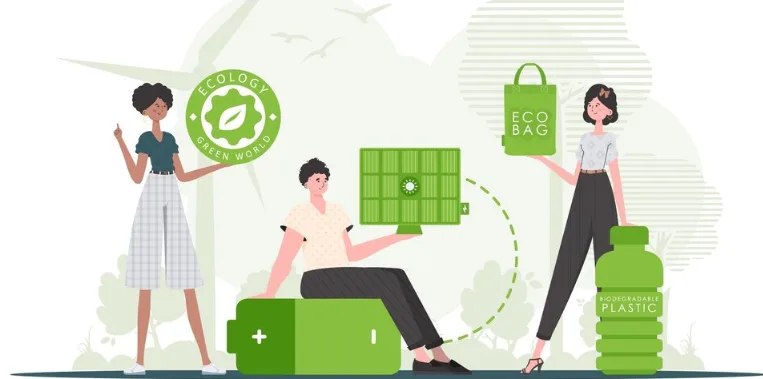
With Shopify Planet, every shipment’s carbon footprint is automatically calculated and offset. That means:
- Customers get their products guilt-free.
- You get to show off your sustainability efforts effortlessly.
- The planet takes a little less of a hit from shipping emissions.
It’s like planting trees every time you make a sale—except you don’t have to do the digging. And the best part? Customers appreciate brands that take responsibility for their environmental impact, making them more likely to buy from you again.
Comparison Table: Carbon-Neutral Shipping vs. Traditional Shipping
| Feature | Carbon-Neutral Shipping | Traditional Shipping |
|---|---|---|
| Environmental Impact | Offsets emissions through reforestation and clean energy projects | Adds carbon emissions to the environment |
| Customer Appeal | Attracts eco-conscious shoppers | No specific eco-benefit |
| Cost | Minimal (through Shopify Planet) | Standard shipping costs apply |
2. Eco-Friendly Products? Make Sure They Stand Out
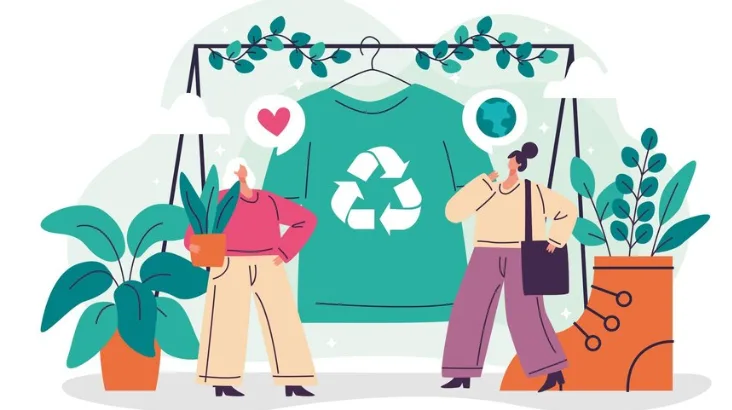
Let’s say you sell sustainable products—maybe organic cotton clothing, biodegradable phone cases, or upcycled home decor. That’s awesome! But if customers don’t know what makes them special, they might scroll right past.
That’s where eco-product highlighting comes in. Shopify lets you:
- Add sustainability badges to product listings (like “Made from 100% recycled materials” or “Zero-waste packaging”).
- Create a ‘Shop Green’ collection so eco-conscious shoppers can find everything in one place.
- Tell the story in your descriptions—explain what makes the product sustainable and why it matters.
People love feeling like their purchases make a difference. A simple label or a well-crafted description can be the push they need to hit “Buy Now.”
3. Badges Build Trust (and Boost Sales)
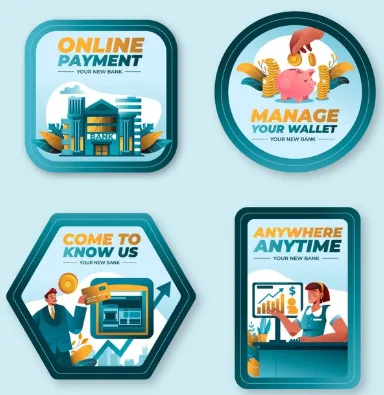
Let’s be real—greenwashing is everywhere. Customers know this, and they’re skeptical. That’s why third-party sustainability badges can be a game-changer. Shopify lets you display recognized certifications like:
- Fair Trade Certified
- Organic Certified
- Carbon Neutral Shipping
- Plastic-Free Packaging
These little icons act as trust signals, reassuring customers that your brand is genuinely committed to sustainability—not just slapping on a buzzword. Stores that use these badges see higher conversions because shoppers feel more confident in their purchases.
How Sustainability Badges Help Your Store:
| Badge Type | Customer Perception | Sales Impact |
|---|---|---|
| Fair Trade Certified | Ethical sourcing, fair wages | Higher trust and conversion rates |
| Carbon Neutral Shipping | Environmentally responsible | Appeals to eco-conscious buyers |
| Organic Certified | High-quality, chemical-free | Preferred by health-conscious consumers |
| Plastic-Free Packaging | Reduced waste | Encourages sustainable shopping choices |
4. Feature Customer Reviews About Sustainable Purchases

Nothing builds trust like real customer feedback. If your customers love your eco-friendly products, showcase their experiences. Add a “Sustainability Spotlight” section featuring reviews that mention eco-friendly aspects of your products.
Encourage buyers to leave reviews about:
- The quality and durability of your sustainable products
- How the eco-friendly packaging made them feel
- Their experience with carbon-neutral shipping
Adding user-generated content not only boosts credibility but also strengthens your brand’s commitment to sustainability.
5. Launch a “How Green Is Your Cart?” Quiz
The quiz can: Want to make sustainability fun and interactive? Add a “How Green Is Your Cart?” quiz to your store! This short quiz can help customers understand their eco-impact and nudge them toward more sustainable choices.
| Question | Answer Choices |
| Do you choose carbon-neutral shipping when available? | Yes / No |
| Are you buying products made from recycled or sustainable materials? | Always / Sometimes / Never |
| Would you consider plastic-free packaging? | Absolutely / Maybe / No |
At the end, suggest eco-friendly products based on their answers.
6. Offer Sustainable Subscription Boxes

A great way to encourage repeat purchases while promoting sustainability is through subscription boxes. Offer:
- Monthly eco-friendly product bundles (e.g., zero-waste starter kits, sustainable beauty products).
- Exclusive perks for subscribers (discounts, early access to new products, carbon-neutral delivery).
- A commitment to reducing packaging waste by using minimal or compostable packaging.
Subscription models drive predictable revenue while keeping customers engaged with your brand’s mission.
Case Studies: Success Stories of Green Shopify Stores
Many Shopify stores have already embraced sustainability and seen impressive results. Here are a few examples:
- Patagonia – A leader in ethical fashion, Patagonia uses recycled materials, promotes repair over replacement, and donates 1% of sales to environmental causes.
- Package Free – A zero-waste store that sells plastic-free alternatives, with packaging designed to be 100% compostable.
- Allbirds – Uses natural materials like wool and sugarcane for footwear and actively works to reduce its carbon footprint.
These brands show that sustainability isn’t just good for the planet—it’s great for business too.
Solutions for a Greener Store:
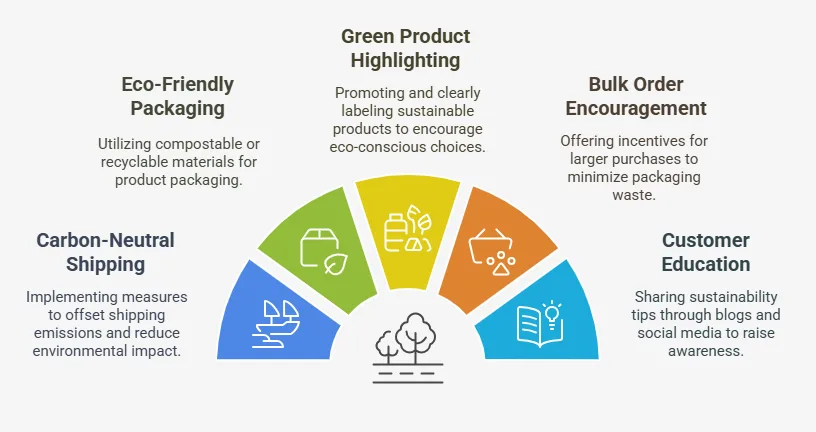
A Future Outlook: Where Sustainable eCommerce is Headed
The future of eCommerce is undeniably green. Here’s what to expect:
- Stricter Regulations on Sustainability Claims – Governments are cracking down on greenwashing, meaning brands will need transparent and verifiable sustainability practices.
- Growth of Circular Commerce – More brands will offer resale, repair, and recycling programs to extend product lifespans and reduce waste.
- Increased Demand for Eco-Friendly Packaging – Customers are actively seeking plastic-free, compostable, and minimal packaging options.
- Rise of Carbon Footprint Transparency – Expect to see more brands providing detailed carbon footprint data for each product, allowing customers to make informed decisions.
Conclusion
Sustainability isn’t just a trend—it’s the future of eCommerce. Customers are actively seeking brands that align with their values, and Shopify makes it easier than ever to integrate eco-friendly practices into your store. From carbon-neutral shipping to sustainability badges and customer engagement tools, there are countless ways to make your store greener and more profitable.
Start making small changes today, and watch as your brand becomes a leader in the green revolution. After all, a more sustainable store isn’t just good for the planet—it’s great for business too.
FAQs
1. What is carbon-neutral shipping, and how does it work?
Carbon-neutral shipping means that the carbon emissions from delivering your package are offset by investing in environmental projects, like reforestation or renewable energy.
2. How can I tell if a product is actually sustainable?
Look for third-party certifications like Fair Trade, GOTS (Global Organic Textile Standard), or Carbon Neutral labels. Also, check product descriptions for details on materials and sourcing.
3. Do customers really care about sustainability when shopping online?
Absolutely! Studies show that more than 70% of consumers prefer to buy from brands that are making an effort to be eco-friendly.
IF YOU REACH AT END, GO GIVE A LOOK AT blogs ON OUR MAIN website.
